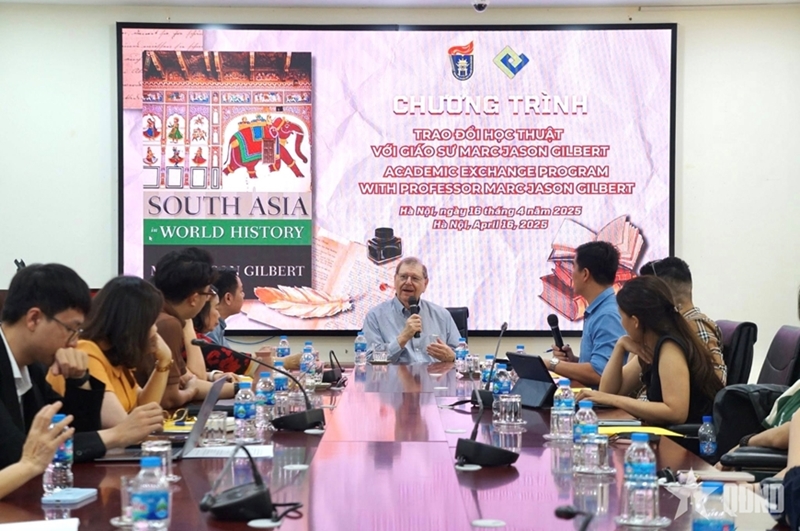Gilbert’s connection with Vietnam began in his teenage years. As a high school student, he joined anti-war movements opposing the war in Vietnam. He wanted to understand why Washington’s foreign policy, particularly its military interventions abroad, failed to bring results and contradicted the will of peace-loving Americans. From that moment, he also supported freedom of the press for anti-war journalists.
    |
 |
|
Prof. Gilbert engaging in academic exchange at the University of Social Sciences and Humanities |
In 1966, while studying at UCLA, Gilbert worked as an assistant for a research group funded by the U.S. Department of Defense to explore peaceful solutions to conflicts, including the war in Vietnam. Immersed in public debate, he studied the war’s injustice and soon became a prominent student to voice against it.
He joined major demonstrations, such as the march in Century City in 1967, the burning of a Bank of America branch in Isla Vista in 1970, and protests at Camp Pendleton exposing the government’s lies about the war. “I felt I needed to do something for that small yet heroic country on the other side of the world,” he recalled.
At 22, Gilbert rejected military conscription and even demanded imprisonment to show his opposition to the war. He continued to participate in protests across California, San Francisco, and Boston, while supporting American veterans who turned against the war. From the 1970s onward, as he pursued an academic career, Gilbert remained active in peace efforts, collaborating with actors and poets such as Howard Hesseman, Mike Farrell, W.D. Ehrhart, and David Connolly to organize readings exposing the brutality of war.
After peace was restored in Vietnam, Gilbert had the opportunity to visit the beautiful country himself. Upon returning, he began nurturing the idea of promoting the normalization of U.S. – Vietnam relations. In late 1994, he personally wrote to President Bill Clinton, stressing the urgent need for Washington to advance bilateral normalization with Vietnam. To his surprise, not long afterward, President Clinton responded, “We are initiating that process.” And indeed, on July 11, 1995, just over eight months later, President Clinton announced the normalization of diplomatic relations between the two nations, opening up a new chapter in the bilateral relationship. For Gilbert, the historic moment, when Vietnam and the U.S. chose to set aside the past and move forward, remains unforgettable. Later, when he had the chance to meet and speak with President Clinton, the U.S. leader affirmed that normalizing relations with Vietnam was one of the most significant diplomatic achievements of his presidency.
Over the past 30 years, Gilbert has returned to Vietnam frequently. He has taken part in workshops on teaching world history for lecturers at the Vietnam Academy of Social Sciences and the University of Social Sciences and Humanities under Hanoi-based National University. He continues to contribute to Vietnamese historical studies, promote academic exchanges between Vietnamese and American scholars, and support Vietnamese doctoral candidates pursuing studies in the U.S. He affirms that this is also a way to foster people-to-people exchanges and strengthen Vietnam – U.S. relations.
Drawing from his experience in anti-war movements, Gilbert has written, edited, and published numerous works.
Throughout his life, Gilbert has remained deeply connected with Vietnam through a bond of loyalty and friendship. He cherishes the country’s traditional culture while also admiring its remarkable strides in modernization. He remarked that the spirit of solidarity and love for peace among the Vietnamese people is like an eternal flame that has fueled the nation’s resilience in overcoming countless hardships to reach independence and freedom. “The desire for self-determination, and above all, the sense of national pride in every Vietnamese person, is truly invaluable,” Gilbert shared.
Translated by Tran Hoai